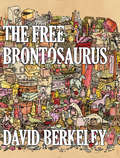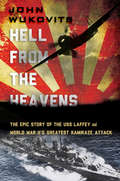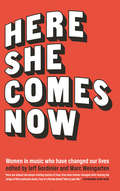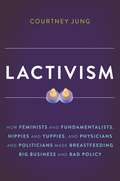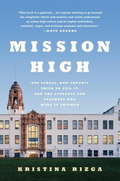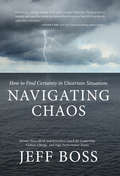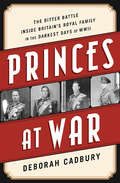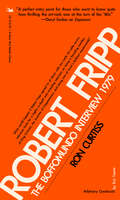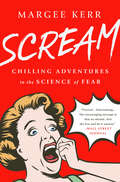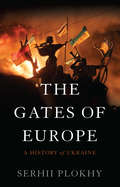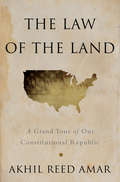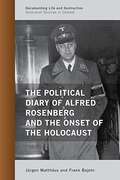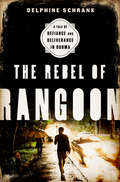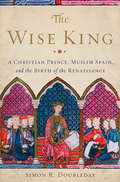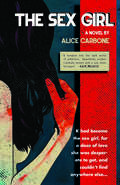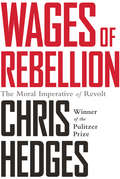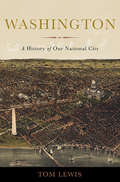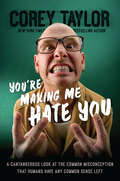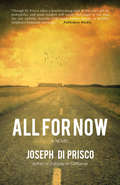- Table View
- List View
FreeBrontosaurus
by David BerkeleyThe Free Brontosaurus is a novella comprising ten interweaving stories, complete with an accompanying album of ten songs. All set in the same fictional city, at the same moment in time, minor characters in one story are major characters in another. It is a bit like Olive Kitteridge, if reimagined by Miranda July. These are gently written narratives of isolation, describing characters disconnected from home and community. The book is full of dark humor, sadness and glimmers of joy. Ultimately, the characters’ abilities to find beauty in the bizarre connect and redeem them, offering the characters (and us) hope. The book is only half of this project, though, for it also comes with a soundtrack, one song per story, written loosely from the perspective of the main character from each tale. Both the book and the album can stand alone. However, when the two are appreciated together, an unusually moving and multi-layered world is born, likely to break and heal the heart.
Hell From the Heavens: The Epic Story of the USS Laffey and World War II's Greatest Kamikaze Attack
by WukovitsOn the morning of April 16, 1945, the crewmen of the USS Laffey saw what seemed to be the entire Japanese air force assembled directly above. They were about to become the targets of the largest single-ship kamikaze attack of World War II. By the time the unprecedented assault was finished, thirty-two sailors were dead and more than seventy wounded. Although she lay shrouded in smoke and fire for hours, the Laffey somehow survived. The gutted American warship limped from Okinawa’s shore for home, where the ship and crew would be feted as heroes. Using personal interviews with survivors, the memoirs of crew members, and their wartime correspondence, John Wukovits breathes life into the story of this forgotten historic event.
Here She Comes Now
by Marc Weingarten edited by Jeff GordinierWhether it was Patti Smith's angry moan, Nina Simone's guttural growl, or Dolly Parton's towering hair and sweet voice, women have been a musical force to be reckoned with, inspired by, and paid attention to. In Here She Comes Now, today's biggest and brightest writers tackle their favorite female musicians and the effect they've had on their own lives. From Rosie Schaap writing about Sandy Denny to Susan Choi writing about Stevie Nicks to Elissa Schappell writing about Kim Gordon, Here She Comes Now thoughtfully and lovingly discusses the extreme badassery of the women who break through all the barriers to truly rock.
Lactivism: How Feminists and Fundamentalists, Hippies and Yuppies, and Physicians and Politicians Made Breastfeeding Big Business and Bad Policy
by Courtney JungIs breast really best? Breastfeeding is widely assumed to be the healthiest choice, yet growing evidence suggests that its benefits have been greatly exaggerated. New moms are pressured by doctors, health officials, and friends to avoid the bottle at all costs--often at the expense of their jobs, their pocketbooks, and their well-being. In Lactivism, political scientist Courtney Jung offers the most deeply researched and far-reaching critique of breastfeeding advocacy to date. Drawing on her own experience as a devoted mother who breastfed her two children and her expertise as a social scientist, Jung investigates the benefits of breastfeeding and asks why so many people across the political spectrum are passionately invested in promoting it, even as its health benefits have been persuasively challenged. What emerges is an eye-opening story about class and race in America, the big business of breastfeeding, and the fraught politics of contemporary motherhood.
Mission High: One School, How Experts Tried to Fail It, and the Students and Teachers Who Made It Triumph
by Kristina Rizga"This book is a godsend . . . a moving portrait for anyone wanting to go beyond the simplified labels and metrics and really understand an urban high school, and its highly individual, resilient, eager and brilliant students and educators. ” --Dave Eggers, co-founder, 826 National and ScholarMatch Darrell is a reflective, brilliant young man, who never thought of himself as a good student. He always struggled with his reading and writing skills. Darrell’s father, a single parent, couldn't afford private tutors. By the end of middle school, Darrell’s grades and his confidence were at an all time low. Then everything changed. When education journalist Kristina Rizga first met Darrell at Mission High School, he was taking AP calculus class, writing a ten-page research paper, and had received several college acceptance letters. And Darrell was not an exception. More than 80 percent of Mission High seniors go to college every year, even though the school teaches large numbers of English learners and students from poor families. So, why has the federal government been threatening to close Mission High--and schools like it across the country? The United States has been on a century long road toward increased standardization in our public schools, which resulted in a system that reduces the quality of education to primarily one metric: standardized test scores. According to this number, Mission High is a "low-performing” school even though its college enrollment, graduation, attendance rates and student surveys are some of the best in the country. The qualities that matter the most in learning--skills like critical thinking, intellectual engagement, resilience, empathy, self-management, and cultural flexibility--can’t be measured by multiple-choice questions designed by distant testing companies, Rizga argues, but they can be detected by skilled teachers in effective, personalized and humane classrooms that work for all students, not just the most motivated ones. Based on four years of reporting with unprecedented access, the unforgettable, intimate stories in these pages throw open the doors to America’s most talked about--and arguably least understood--public school classrooms where the largely invisible voices of our smart, resilient students and their committed educators can offer a clear and hopeful blueprint for what it takes to help all students succeed.
NavigatingChaos
by Jeff BossJeff Boss has faced and overcome uncertainty in the most tumultuous circumstances. As a Navy SEAL, he worked in some of the most unforgiving environments on earth and faced enemies that constantly changed, much like today's business landscape. In a world of chaos, how do individuals and teams stay together to find certainty in a world where there is anything but? This book reveals how. Using anecdotal experiences from both the military and business worlds, Boss highlights the mindset and practical steps of how people and organizations can forge certainty amidst inevitable chaos.
Princes at War: The Bitter Battle Inside Britain's Royal Family in the Darkest Days of WWII
by Deborah CadburyThis book tells the story of four sons of King George V during the period that the monarchy faced the greatest threats to its survival in the modern era the crisis of the abdication, and the nationwide threat to Britain of the Nazis, inside and out. The threat of world war echoed the war within the royal family. Played out against the cataclysm of the Second World War the princes’ actions for good or ill became all the more significant and magnified on a world stage. The war served to unleash passions at a time when the very function of royalty as head of the empire was under threat. It served as a crucible that made or destroyed each of the princes. One would die in mysterious circumstances forever mired in conspiracy and scandal; another was destroyed in all but name, a third slipped into comfortable obscurity, and the fourth rose to new heights of achievement redefining the monarchy for the modern age. The catalyst for the story is one dangerous American woman: Wallis Simpson. The consequences of her actions drive one prince to an early grave and the other to become a living wreck of a man nursing long held grievances. Recently discovered letters show that Wallis herself was caught in a trap of her own making: a life entombed in a gilded cage with a man she could not respect and whom she tried to leave. Everything she wished for, she destroyed. Famously she is said to have been sent 17 carnations by the Nazi Joachim von Ribbentrop, representing their 17 sexual trysts. George VI’s story is also an allegory for a much wider theme. Starting where the film The Kings Speech ends, a revealing transformation in his character takes place. As he steps up with some dread to the role of king that his older brother spurns, his horizons are widened and he falls into the sphere of influence of brilliant leaders such as Winston Churchill. As Hitler stole country after country for the Third Reich, George VI rose to the challenge, to find the very best in himself, and was transformed by the effort. By the end he can stand alone at the helm, without the support of those who helped him on his way Like fables of old, taking on the challenge transforms the quality of the man but it is also killing him.
Robert Fripp: The Boffomundo Interview
by Ron CurtiessOfficially transcribed from the original Boffomundo archives, Robert Fripp: The Boffomundo Interview 1979 reveals an intriguing and unique look into the mind of one of music's masters of precision and creativity -- all through the subtle brilliance of Wayne's World-esque early L. A. cable access hosts Ron Curtiss and Aaron Weiner. Featuring aired and unaired content from their 1979 interview, a new introduction by Ron Curtiss, and additional contextualizing articles and interviews, this is a gem that could have been long forgotten if not for Curtiss’s archival masterminding and his dedication to preserving the prog legacy. This book is a must-have for all fans of King Crimson, David Bowie, philosophical self-inquisition, and technological wizardry. A Rare Bird Exclusive: Purchasers of the ebook will receive access to a video of the full interview.
Scream: Chilling Adventures in the Science of Fear
by Margee KerrShiver-inducing science not for the faint of heart. No one studies fear quite like Margee Kerr. A sociologist who moonlights at one of America’s scariest and most popular haunted houses, she has seen grown men laugh, cry, and push their loved ones aside as they run away in terror. And she’s kept careful notes on what triggers these responses and why. Fear is a universal human experience, but do we really understand it? If we’re so terrified of monsters and serial killers, why do we flock to the theaters to see them? Why do people avoid thinking about death, but jump out of planes and swim with sharks? For Kerr, there was only one way to find out. In this eye-opening, adventurous book, she takes us on a tour of the world’s scariest experiences: into an abandoned prison long after dark, hanging by a cord from the highest tower in the Western hemisphere, and deep into Japan’s mysterious "suicide forest. ” She even goes on a ghost hunt with a group of paranormal adventurers. Along the way, Kerr shows us the surprising science from the newest studies of fear--what it means, how it works, and what it can do for us. Full of entertaining science and the thrills of a good ghost story, this book will make you think, laugh--and scream.
The Gates of Europe
by PlokhyUkraine is currently embroiled in a tense battle with Russia to preserve its economic and political independence. But today’s conflict is only the latest in a long history of battles over Ukraine’s existence as a sovereign nation. As award-winning historian Serhii Plokhy argues in The Gates of Europe, we must examine Ukraine’s past in order to understand its fraught present and likely future. Situated between Europe, Russia, and the Asian East, Ukraine was shaped by the empires that have used it as a strategic gateway between East and West—from the Romans and Ottomans to the Third Reich and the Soviet Union, all have engaged in global fights for supremacy on Ukrainian soil. Each invading army left a lasting mark on the landscape and on the population, making modern Ukraine an amalgam of competing cultures. Authoritative and vividly written, The Gates of Europe will be the definitive history of Ukraine for years to come.
The Gates of Europe
by PlokhyUkraine is currently embroiled in a tense battle with Russia to preserve its economic and political independence. But today’s conflict is only the latest in a long history of battles over Ukraine’s existence as a sovereign nation. As award-winning historian Serhii Plokhy argues in The Gates of Europe, we must examine Ukraine’s past in order to understand its fraught present and likely future. Situated between Europe, Russia, and the Asian East, Ukraine was shaped by the empires that have used it as a strategic gateway between East and West—from the Romans and Ottomans to the Third Reich and the Soviet Union, all have engaged in global fights for supremacy on Ukrainian soil. Each invading army left a lasting mark on the landscape and on the population, making modern Ukraine an amalgam of competing cultures. Authoritative and vividly written, The Gates of Europe will be the definitive history of Ukraine for years to come.
The Law of the Land: A Grand Tour of Our Constitutional Republic
by Akhil Reed AmarFrom Kennebunkport to Kauai, from the Rio Grande to the Northern Rockies, ours is a vast republic. While we may be united under one Constitution, separate and distinct states remain, each with its own constitution and culture. Geographic idiosyncrasies add more than just local character. Regional understandings of law and justice have shaped and reshaped our nation throughout history. America’s Constitution, our founding and unifying document, looks slightly different in California than it does in Kansas. In The Law of the Land, renowned legal scholar Akhil Reed Amar illustrates how geography, federalism, and regionalism have influenced some of the biggest questions in American constitutional law. Writing about Illinois, "the land of Lincoln,” Amar shows how our sixteenth president’s ideas about secession were influenced by his Midwestern upbringing and outlook. All of today’s Supreme Court justices, Amar notes, learned their law in the Northeast, and New Yorkers of various sorts dominate the judiciary as never before. The curious Bush v. Gore decision, Amar insists, must be assessed with careful attention to Florida law and the Florida Constitution. The second amendment appears in a particularly interesting light, he argues, when viewed from the perspective of Rocky Mountain cowboys and cowgirls. Propelled by Amar’s distinctively smart, lucid, and engaging prose, these essays allow general readers to see the historical roots of, and contemporary solutions to, many important constitutional questions. The Law of the Land illuminates our nation’s history and politics, and shows how America’s various local parts fit together to form a grand federal framework.
The Political Diary of Alfred Rosenberg and the Onset of the Holocaust
by Frank Bajohr Jürgen MatthäusPublished in association with the United States Holocaust Memorial Museum <P><P> In December 2013, after years of exhaustive search, the U.S. Holocaust Memorial Museum received more than four hundred pages of diary notes written by one of the most prominent Nazis, the Party’s chief ideologue and Reich minister for the occupied Soviet territories Alfred Rosenberg. By combining Rosenberg’s diary notes with additional key documents and in-depth analysis, this book shows Rosenberg’s crucial role in the Nazi regime’s anti-Jewish policy. In the second half of 1941 the territory administered by Rosenberg became the region where the mass murder of Jewish men, women, and children first became a systematic pattern. Indeed, months before the emergence of German death camps in Poland, Nazi leaders perceived the occupied Soviet Union as the area where the “final solution of the Jewish question” could be executed on a European scale. Covering almost the entire duration of the Third Reich, these previously inaccessible sources throw new light on the thoughts and actions of the leading men around Hitler during critical junctures that led to war, genocide, and Nazi Germany’s final defeat.
The Rebel of Rangoon: A Tale of Defiance and Deliverance in Burma
by Delphine SchrankAn epic, multigenerational story of courage and sacrifice set in a tropical dictatorship on the verge of massive transformation, The Rebel of Rangoon captures a gripping moment of possibility in Burma. Journalist Delphine Schrank spent four years underground tracking Burmese dissidents whose semi-clandestine existence and fight for democracy remained largely hidden behind their globally celebrated figurehead, Aung San Suu Kyi. With intimate, vivid prose, Schrank follows the inner life of a daredevil young dissident, his friends and rivals, across rural hamlets and flickering internet connections, into prison cells and safe houses, and deep into their own hearts, as they escape spies and outwit interrogators, fall in love or slip into insanity. Through that dissident’s perspective, Schrank unfurls a harrowing account of a country’s efforts to emerge from military dictatorship, how a movement of dissidents came into being, how it almost died, and how it pushed its government to crack apart and begin an irreversible process of political reform. In doing so, Schrank delivers a profoundly human exploration of daring and defiance and of the power and meaning of freedom.
The Wise King: A Christian Prince, Muslim Spain, and the Birth of the Renaissance
by Simon R. Doubleday"If I had been present at the Creation,” the thirteenth-century Spanish philosopher-king Alfonso X is said to have stated, "Many faults in the universe would have been avoided. ” Known as El Sabio, "the Wise,” Alfonso was renowned by friends and enemies alike for his sparkling intellect and extraordinary cultural achievements. In The Wise King, celebrated historian Simon R. Doubleday traces the story of the king’s life and times, leading us deep into his emotional world and showing how his intense admiration for Spain’s rich Islamic culture paved the way for the European Renaissance. In 1252, when Alfonso replaced his more militaristic father on the throne of Castile and León, the battle to reconquer Muslim territory on the Iberian Peninsula was raging fiercely. But even as he led his Christian soldiers onto the battlefield, Alfonso was seduced by the glories of Muslim Spain. His engagement with the Arabic-speaking culture of the South shaped his pursuit of astronomy, for which he was famed for centuries, and his profoundly humane vision of the world, which Dante, Petrarch, and later Italian humanists would inherit. A composer of lyric verses, and patron of works on board games, hunting, and the properties of stones, Alfonso is best known today for his Cantigas de Santa María (Songs of Holy Mary), which offer a remarkable window onto his world. His ongoing struggles as a king and as a man were distilled--in art, music, literature, and architecture--into something sublime that speaks to us powerfully across the centuries. An intimate biography of the Spanish ruler in whom two cultures converged, The Wise King introduces readers to a Renaissance man before his time, whose creative energy in the face of personal turmoil and existential threats to his kingdom would transform the course of Western history.
TheSexGirl
by Alice CarboneIn 1994, one month after the Northridge earthquake and two years after the riots, K moves to Los Angeles to escape her demons. That's the thing about demons though, they tend to follow. At once honest and heartbreaking, The Sex Girl digs deep into the female psyche, dealing with addiction, sex, love, and friendship. K's story, and the unique way in which it's told adds a new literary voice to the mix. Alice Carbone's fresh take on the drug addiction novel, earns a place amongst the tortured junkies. With a sense of impending tragedy, Carbone weaves K's life together through found diaries and recollections, and in doing so she unpacks the density of a single person's story.
Wages of Rebellion
by Chris HedgesIn the face of modern conditions, revolution is inevitable. The rampant inequality that exists between the political and corporate elites and the struggling masses; the destruction wreaked upon our environment by faceless, careless corporations; the steady stripping away of our civil liberties and the creation of a monstrous surveillance system--all of these have combined to spark a profound revolutionary moment. Corporate capitalists, dismissive of the popular will, do not see the fires they are igniting. In Wages of Rebellion, Chris Hedges--a renowned chronicler of the malaise and sickness of a society in terminal moral decline--investigates what social and psychological factors cause revolution and resistance. Focusing on the stories of radicals and dissenters from around the world and throughout history, and drawing on an ambitious overview of prominent philosophers, historians, and novelists, Hedges explores what it takes to be a rebel in modern times. Hedges, using a term coined by the theologian Reinhold Niebuhr, cites "sublime madness” as the essential force that guides the actions of rebels--the state of passion that causes the rebel to engage in an unwavering fight against overwhelmingly powerful and oppressive forces. From South African activists who dedicated their lives to ending apartheid, to contemporary anti-fracking protestors in Canada, to whistleblowers in pursuit of transparency, Wages of Rebellion shows the cost of a life committed to speaking truth to power and demanding justice. This is a fight that requires us to find in acts of rebellion the sparks of life, an intrinsic meaning that lies beyond the possibility of success. For Hedges, resistance is not finally defined by what we achieve, but by what we become.
Washington: A History of Our National City
by Tom LewisOn January 24, 1791, President George Washington chose the site for the young nation’s capital: ten miles square, it stretched from the highest point of navigation on the Potomac River, and encompassed the ports of Georgetown and Alexandria. From the moment the federal government moved to the District of Columbia in December 1800, Washington has been central to American identity and life. Shaped by politics and intrigue, poverty and largess, contradictions and compromises, Washington has been, from its beginnings, the stage on which our national dramas have played out. In Washington, the historian Tom Lewis paints a sweeping portrait of the capital city whose internal conflicts and promise have mirrored those of America writ large. Breathing life into the men and women who struggled to help the city realize its full potential, he introduces us to the mercurial French artist who created an ornate plan for the city “en grande”; members of the nearly forgotten anti-Catholic political party who halted construction of the Washington monument for a quarter century; and the cadre of congressmen who maintained segregation and blocked the city’s progress for decades. In the twentieth century Washington’s Mall and streets would witness a Ku Klux Klan march, the violent end to the encampment of World War I “Bonus Army” veterans, the 1963 March on Washington for Jobs and Freedom, and the painful rebuilding of the city in the wake of Martin Luther King, Jr. ’s assassination. “It is our national center,” Frederick Douglass once said of Washington, DC; “it belongs to us, and whether it is mean or majestic, whether arrayed in glory or covered in shame, we cannot but share its character and its destiny. ” Interweaving the story of the city’s physical transformation with a nuanced account of its political, economic, and social evolution, Lewis tells the powerful history of Washington, DC—the site of our nation’s highest ideals and some of our deepest failures.
You're Making Me Hate You: A Cantankerous Look at the Common Misconception That Humans Have Any Common Sense Left
by Corey TaylorIn the tradition of the late great George Carlin, New York Times bestselling author and lead singer of Slipknot and Stone Sour Corey Taylor sounds off in hilarious fashion about the many vagaries of modern life that piss him off. Whether it’s people’s rude behavior in restaurants and malls, the many indignities of air travel, eye-searingly terrible fashion choices, dangerously clueless drivers, and--most of all--the sorry state of much modern music, Taylor’s humor and insight cover civil society’s seeming decline--sparing no one along the way, least of all himself. Holding nothing back and delivered in Taylor’s inimitable voice, You’re Making Me Hate You is a cathartic critique of the strange world in which we find ourselves.
اعتراض الشرط على الشرط
by ابن هشام الأنصارييناقش ابن هشام في كتابه "اعتراض الشرط على الشرط" بعض المسائل اللغوية الهامة المتعلقة بمسألة اعتراض الشرط على الشرط
الأمن الوظيفى بعد التحكيم
by الذراع الاجتماعي لأكاديمية شرطة دبييمكن القول أن قضية الأمن الاقتصادى، على صعيد الاقتصاديات المتقدمة، تعد أحد أهم المكونات الجوهرية في السياسة الاقتصادية منذ الحرب العالمية الثانية ؛ فإذا كان خط الدفاع الأول عن كيان المجتمع، هو تحقق الأمن العام، فإن الأمن الاقتصادى يقع فى قلب الأمن العام؛ فلا كيان لدولة ما ولا استقرار بدون تحقق الأمن العام، ولا تحقق للأمن العام بدون تحقق الأمن الاقتصادى، مما يستوجب تمسك الدولة بتلابيبه إن كانت جادة في الحفاظ على أمنها العام.
الشافية في علم التصريف
by جمال الدين أبي عمرو عثمان بن عمر الدوينيكتاب "الشافية" لجمال الدين أبي عمرو عثمان الدويني في علم التصريف هو احد كتب علوم اللغة العربية
خزانة الأدب وغاية الأرب
by تقي الدين أبي بكر علي بن عبد الله الحموي الأزراريالكتاب يتناول تاريخ الأدب في عصر المماليك ويعد لذلك من الكتب التي لا غنى عنها للباحثين في الأدب إذ ضمنه كثيراً من نماذج شعراء عصره وقدم تصويراً دقيقاً للحياة الأدبية آنذاك ولعل هذا الكتاب يعد من أبرز ما ألف .
ديوان أبي الهدى الصيادي
by أبي الهدى الصياديمحمد بن حسن وادي بن علي بن خزام الصيادي الرفاعي الحسيني، من علماء الدين البارزين في أواخر عهد الدولة العثمانية، حيث تولّى فيها منصب "شيخ مشايخ الدولة العثمانية له مؤلفات في العلوم الاسلامية و اخرى ادبية ومجال الشعر بشكل خاص
All For Now
by Joseph Di PriscoBrother Stephen dies suddenly. That’s when things get complicated. Is Stephen’s death his wake-up call? This possibility slowly dawns on him. Soon, though, he is behind the wheel of a Prius, driving through his afterlife, listening to himself being interviewed on NPR. "It’s just like high school, Terry. You know, maybe it is high school,” he tells her, in the interview, as she questions him about lawsuits filed by students who claimed to have been molested by pedophile Brothers. As an administrator of his Roman Catholic religious order, he was caught in the middle of these heartbreaking cases. In fact, the lawsuit he was dealing with the moment he died is one that strikes especially close to his heart. He once knew the plaintiff--he once knew her very well--but he also knew the Brother who is named in the lawsuit. Now that he’s dead, he’s more determined than ever to get to the truth. He spends his afterlife unraveling this terrible mystery, learning more about the plight of the survivor and that of the accused, but the biggest mystery he faces is one about himself.
